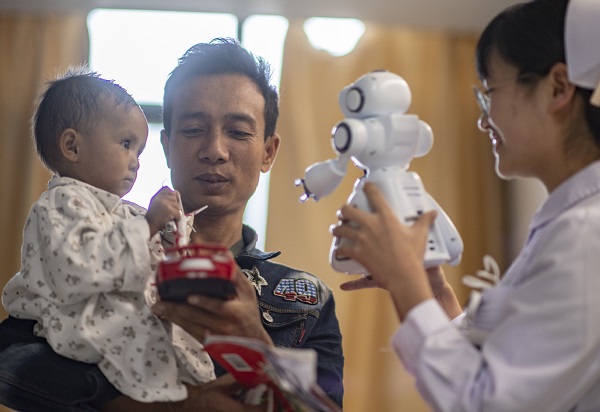Medical aid program brings new hope to families


Zar Yi Myint and her son arrived at Kunming, capital of Yunnan province, on the night of Dec 4. A picture capturing their arrival shows a purple hue to the skin and lips of the boy in her arms. Her son, who was then 2 years and 8 months old, seemed too skinny for a child his age. He was suffering from a serious congenital heart defect that put his life in danger.
The boy was admitted to Fuwai Yunnan Cardiovascular Hospital the next day. After two days of examinations and close observation, doctors performed an emergency operation on him on Dec 7.
He is among eight children from Myanmar, which borders Yunnan province, who joined a program to receive treatment for their congenital heart defects at the hospital.
Since taking in the first 12 children from Myanmar in 2017, the program has helped 35 young patients with congenital heart defects in the Southeast Asian country to obtain treatment in China for free, according to Xu Yixuan, executive director of the Chinese Journalist Volunteers Association for Charity Promotion.
The China Charity Federation is one of the program's sponsors, and pays for the children's treatment. The association, a branch under the federation, takes on the work of implementing the program.
Of the 35 cases, 23 were treated at Fuwai Yunnan Cardiovascular Hospital in 2018 and 2019, and the others at Beijing Anzhen Hospital in 2017.
In May 2017, Myanmar's State Counselor Aung San Suu Kyi visited the program's recipients in Beijing Anzhen Hospital, after she attended the Belt and Road Forum for International Cooperation, according to Xinhua News Agency.
The children were diagnosed by Chinese doctors in a hospital in Yangon in Myanmar before coming to China for treatment, Xu said, adding that the program has provided insurance for the patients' trips and covered their travel expenses.
Their conditions tend to be serious and complicated, and were challenging not only for hospitals in Myanmar, but also for teams of foreign doctors dispatched there to help tackle congenital heart diseases, Xu said.
Cost is another factor that stops some families from seeking further treatment, according to Xu.
Zar Yi Myint, a mother of two, said she used to take her son to Yangon for treatment every month, but her husband is the only breadwinner for the family, and they couldn't afford to pay for an operation, which costs at least 5 million kyat ($3,430).
She said she trusted Chinese doctors who had carried out successful operations for children before his son, and that she registered for the program without hesitation.
Her decision was proved right.
After the surgery, which lasted for about five hours, her son appeared healthier and more energetic, and his skin tone started to look normal.
"I was very distressed on the night of the operation. I felt like my son was going to leave me," she said. "I was so happy when I learned the operation went very well. I thanked the Chinese doctors who saved his life."
Surgery for all the eight children, including Zar Yi Myint's son, proceeded smoothly, said Ma Linkun, deputy director of the Fuwai Yunnan Cardiovascular Hospital.
Ma said the 15 children from Myanmar who received treatment in the hospital in 2018 have also recovered well.
For Ma, international medical aid and exchanges are a way of building trust, instead of just about treating and curing people.
"Through the communications they will gain a comprehensive understanding of China's medical system and the quality of its medical care," he said. "Only after this will they have confidence in China's medical technology."




